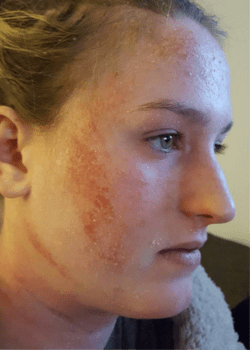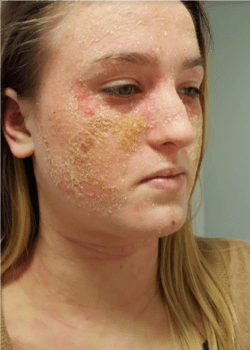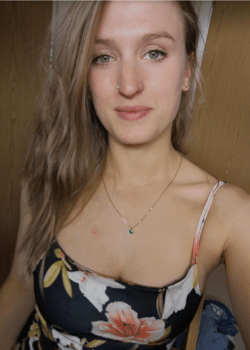Creating Possibility from Pain
Most of us live with skin conditions and learn ways to manage them throughout our daily lives. Sometimes, they kick us when we are down, and sometimes... they inspire us.
What was Imogen's experience with eczema?
Imogen Tingay, all the way from the United Kingdom, is no stranger to battling through bad skin days. Since infancy (literally days after emerging from her mother's C-section) she has dealt with eczema and allergies. "It presented mostly on my face as an infant and toddler," she reveals, "but eventually became more prominent on my limbs during childhood."
Growing up, by doctor's orders, she used emollients, topical antibiotics, and occasionally steroid creams as her skin regimen. However, once into her late teens/early twenties, the steroids became a daily necessity.

How did her experience with steroids change?
Imogen noticed how her topical steroids were losing effectiveness and how she needed more and more to keep her skin happy. "The dermatologist I had seen wanted to progress me onto prednisone, which I strongly declined," she shares. The idea of putting stronger steroids in or on her body just didn't feel right.
So, when she took a closer look at TSW symptoms listed on ITSAN's website, The International Topical Steroids Awareness Network, she knew she was in for a bumpy ride.
What was her topical steroid withdrawal experience?
"The whole experience was a full body onslaught," she proclaims, vividly diving into the details. Her lymph nodes were swollen. The itching was excruciating. She could barely sleep, let alone function. Everywhere was a weeping mess, including her nipples - an area she had never used steroids before. "By month 4 of TSW, my face was so bad I went to the out-of-hours doctor who prescribed three lots of antibiotics (oral, nasal, and topical) as she suspected it was a staphylococcus infection."
All of this went on for about a year before Imogen started to see progress in her healing.

What toll has it emotional taken on her?
Besides her skin falling to pieces, having severe skin problems can wreak havoc on the mind, too.
"Going through TSW goes against all the advice you’ve been given from doctors or parents," she explains, "and although it's empowering to take your health into your own hands, it can feel incredibly isolating." For almost 18 months, Imogen battled depression, anxiety, and even suicidal ideations. Each day was a hurdle, especially when no one understood her pain.
How has she coped?
Imogen decided to open up about her skin on social media and created an account dedicated to her skin journey. It was a game-changer.
"It was through this account that I was able to connect with hundreds of people going through TSW at the same time," Imogen states with relief. "We supported each other and gave each other advice, and most importantly, listened to each other."
Having that support system when your life seems so out of your control gives you an anchor. It allows you to finally be open and free to discuss the hardships that only few understand. "The emotional support I received helped more than any one product that I used on my skin."
How has TSW motivated her?
Instead of crumbling to the ground, an action no one could fault, Imogen instead became motivated to do something about her circumstance. Once she really began to heal, she set off to get her degree in biology in chemistry. This opened the door to study at university.
"My TSW was what finally enabled me to see that my purpose in life is to help others living with chronic skin conditions through diet and lifestyle changes and advice," she relays with pride. She'd learned so much about how to heal while being ill that she is now finishing up her Master’s of Science degree in Allergic Diseases, enabling her to assist patients with food allergies and allergic skin diseases, such as eczema and psoriasis.
Because she is so close to graduating, she has been hitting the social media scene again, amping up for new clients and patients.

What does she want the community to know?
"Focus on healing your body from the inside out," she began. "It's so easy to focus on what you can see in front of you, but eczema is generally a symptom of an internal imbalance... I think it's important to work on the connection you have with your body and skin."
It's not just what's on the outside, but the inside. And I know Imogen will help a lot of people simply from her empathy and personal experience.
"You’re not alone in your feelings and there are people who want to listen and help," Imogen concludes, "they just might be strangers instead of family and friends!"
I think this community truly understands that sentiment! Thank you, Imogen!

Join the conversation